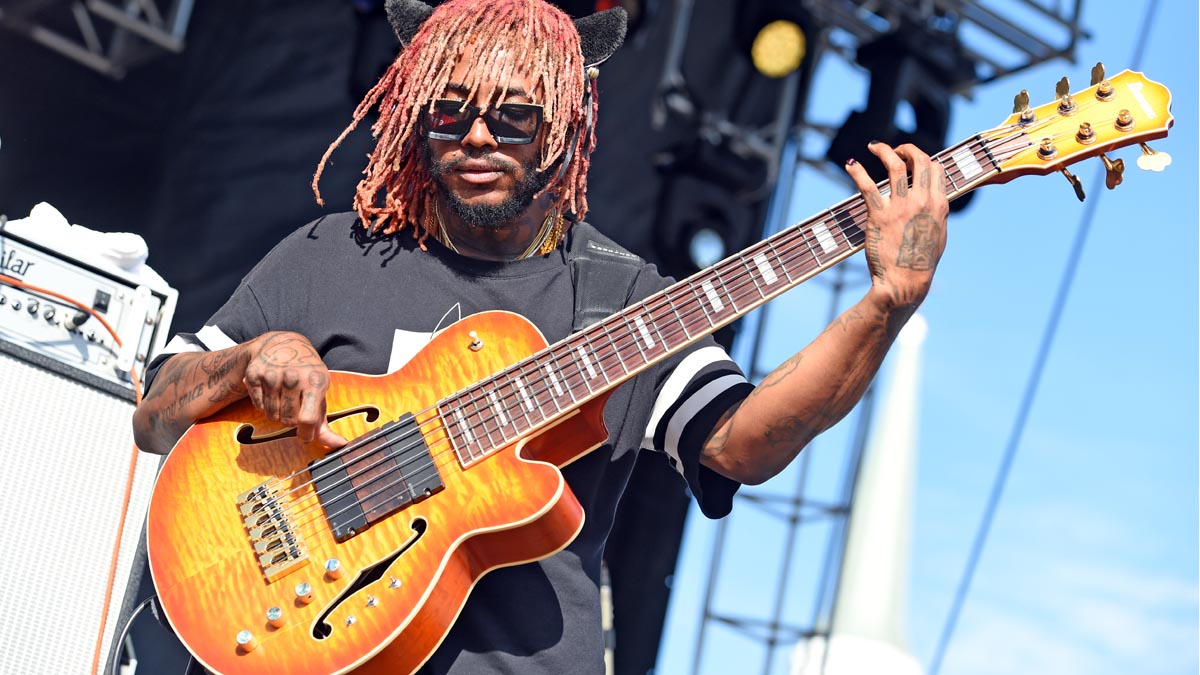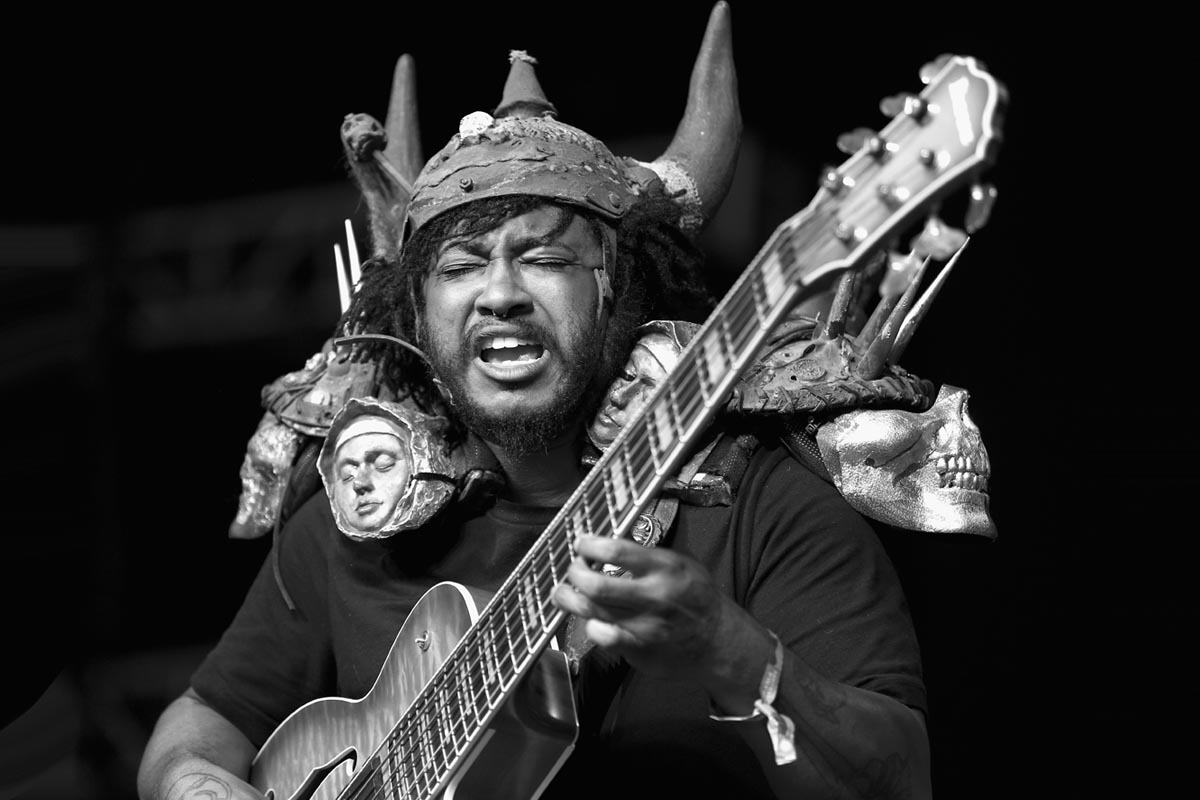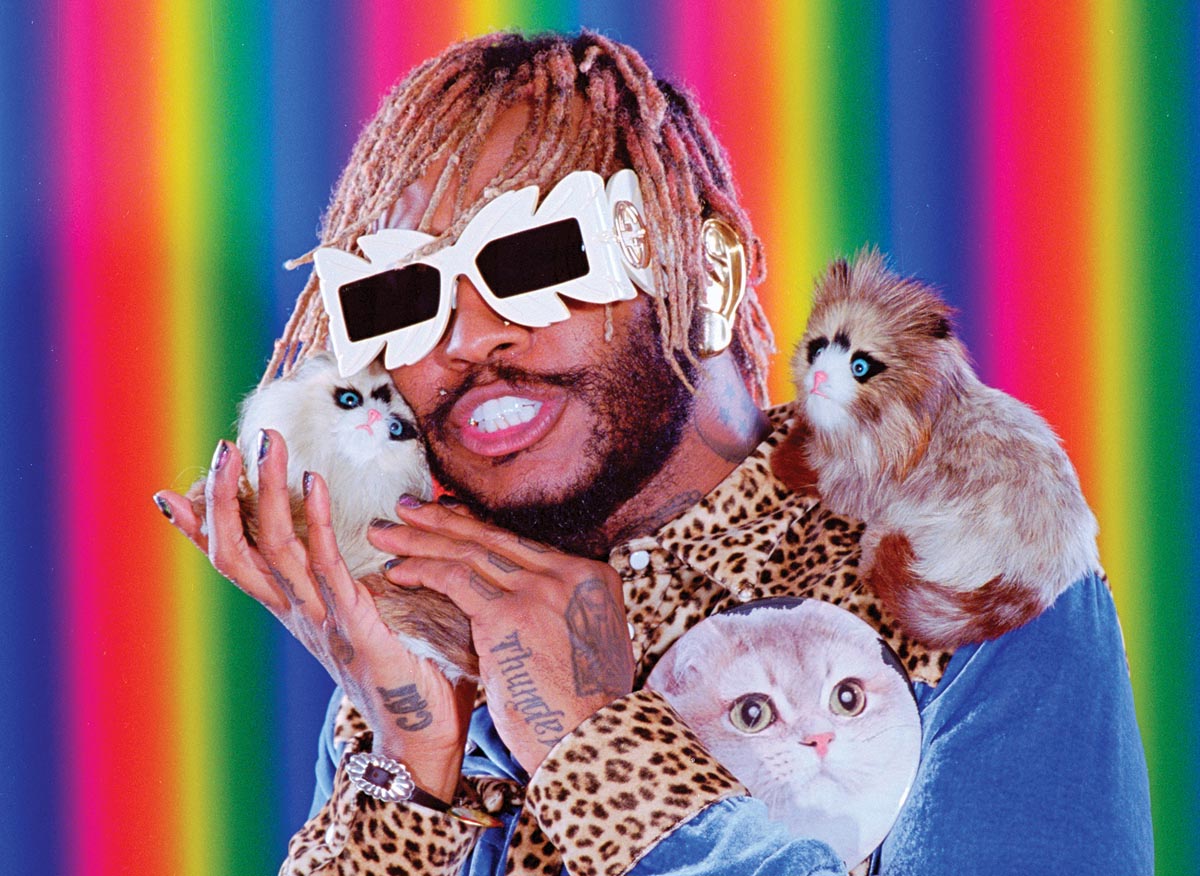Thundercat: “Not every instrument carries the weight to be able to morph and change in the way that bass does“
Want to learn the secrets of the universe? Then you’d better join us as we sit down with Stephen ‘Thundercat’ Bruner

Stephen Lee Bruner is a fascinating character. The Grammy-winning songwriter’s mind functions on a different level to that of the rest of us, at least judging by the conversation we have below, which steps away from the usual bass guitar topics into deeper territory.
Over the years I’ve found that some musicians simply express themselves better with their music than they do with words, and this definitely applies to Bruner, who records under the name Thundercat for reasons that appear to be closer to spiritual than commercial.
Listen to his current fourth album, It Is What It Is, for evidence of this: It’s a restless, groovy blend of electronica, funk, jazz and rock, with multiple bass textures throughout, and a wry lyrical perspective that disguises as much as it reveals.
Produced by long-time collaborator Flying Lotus and featuring contributions from fellow innovators such as Kamasi Washington and Childish Gambino, the album showcases Bruner’s phenomenally deft bass style, delivered on his unique signature six-string bass, the Ibanez TCB1006.
The uncategorizable nature of it all is mirrored in Thundercat’s career, which started with thrash-metal band Suicidal Tendencies and neo-soul queen Erykah Badu before expanding to include music of all stripes.
At 36 years old, Bruner has gained a reputation for taking the bass to places where other musicians are yet to explore. A lot of this is down to his approach to music in general, as he semi-explains here, in a Q&A which ranges from the obscure to the enlightened.
He looks healthier than he did a couple of years ago, having quit drinking alcohol and slimmed down, and is clearly in a good place, psychologically.
Get The Pick Newsletter
All the latest guitar news, interviews, lessons, reviews, deals and more, direct to your inbox!
I could have talked to him all day: the man definitely has a streak of genius, revealed in a stream of consciousness occasionally interrupted by his cat, which he informs me is called Turbotron Over 9000 Baby Jesus Sally. Enjoy it; I did.

What’s happening, Thundercat?
“I exist on multiple different levels of the ego death and self-realization. Every day is a new realistic dynamic of what the fuck is going on. I’m chilling, watching a lot of cartoons, playing some music, playing some video games.“
You’ve had a crazy year, to say the very least.
“Yeah. Intense highs and intense lows.“
You look really healthy. What are the benefits of quitting alcohol?
“Thank you. Everybody experiences life in different ways, and it’s one of those things. It’s just something that resonated for me. For anybody who’s drinking, I would say keep doing your thing. It serves a purpose, but it just stopped serving me. That’s all.“
Are you more creative now you’re fitter?
“Not in particular. It’s just different. It’s always been quite temperamental, but at the same time as it’s been temperamental it’s just kinda what it is. I take the good with the bad, when it comes to it, across the board. Accepting change, you know.“
This sounds like healthy growth.
“I’m working on it. I just started getting back into recording. It took a little bit of time to get comfortable again, just remembering that ‘Oh yeah, you write music, and that’s what you do’. I think it was more about taking the time to let life do what it does, as compared to trying to force myself to be the man that I’ve always been, and like I was saying, accepting changes and stuff like that. As far as musically, I’ve been doing a lot of listening, and I’ve kinda started recording again a bit.“
Do you have any gigs coming up?
“There’s a couple of things in talks right now, you know. I’m a bit more cautious and a bit more cognizant of what the current state of everything is now. I think about possibilities of doing stuff like that, but for the most part I’ve just been letting Covid do what it does and watching everybody flailing and act like they’re getting ahold of it.“
I exist on multiple different levels of the ego death and self-realization. Every day is a new realistic dynamic of what the fuck is going on
How do you define yourself?
“I’m a songwriter and a composer and a bassist, and a bit of a producer and an illustrator.“
Do you play other instruments too?
“No, I only play the bass. I always lived in fear of being that one guy who said, ‘Oh yeah, I can play all these instruments!’ but playing all of them mediocrely. It takes a lot to learn one thing.“
Do you write songs on bass?
“Yeah, it’s mostly the bass. It takes many shapes and forms, you know, and allowing it to guide how I can compose and stuff like that. It’s definitely at the forefront.“
We’re big fans of your signature Ibanez round here.
“Thank you. There’s a reason why it’s been that big for me, how comfortably it sits while I play, but I feel like in due time there will be changes probably made to it to accommodate wherever I’m going next with the instrument. For now, I try to get to a place of a knowledgeable perspective with the instrument, you know, and be able to have something to say. That’s what it is.“

How many of them do you have?
“Only a couple. When we made the original one from the custom shop, I remember them saying to me ‘What in the world are you asking?’ but once we got it done and they got a chance to see it, we made a couple more.
“At first, to be honest with you, I didn’t know what it meant to have a fully hollow-body bass of this caliber, with the amount of tension and stress that it would require. I thought the wood might not allow it, or that I could run into a lot of issues with intonation, because of how heavy the strings are and the way the weather changes and stuff like that.
“The really big thing about making the bass was there was a giant block of wood going straight through the neck, and that made the bass immensely heavy.“
At first I didn’t know what it meant to have a fully hollow-body bass of this caliber, with the amount of tension and stress that it would require. I thought the wood might not allow it
How do you play such a heavy instrument?
“Well, I was up for the challenge, which has to do with strength training. I thought it might create back problems, but I feel like I manage fairly well with it. That’s my mindset about it. Experimenting with what it can be is part of the excitement of what it is, with the acoustic part and the piezo saddle and all that stuff.
“It can do so many different tones that I enjoy very much. It can be like a big gigantic P-Bass. It sticks with me and it’s a joy to play. I think about if there’s something different that I would do. A part of it is like I’m content with what it is as an instrument. Whatever comes next, maybe it’ll be completely different.“
Are you happy with four- and five-string basses, too?
“Yes. I feel like six lends itself to a little more facility, but I was recording with a friend of mine last night and I didn’t bring my bass. I just played the bass that was there, which was just a regular P-Bass, an old '60s model. It brought a different character to my playing. I play different textures. I like to mimic other instruments with my bass.“
I play different textures. I like to mimic other instruments with my bass
What attracted you towards playing bass in the first place?
“It carries a lot of weight, literally and figuratively. We look up and we see guys like a Sting, or like a Jaco Pastorius, or a Stanley Clarke, or a Charles Mingus, and I feel like it transverses worlds because of the roles that it plays.
“I believe that’s unique to the bass, not just because of its frequencies but because the act of playing an instrument and creating a melody and harmony with it, even if someone gives you a chart, takes you to a lot of different places and it becomes a completely different thing.
“Not every instrument carries the weight to be able to morph and change in the way that bass does, which is why I always compare it to trap music. Why is it people love rap and trap music the way they do? Maybe because the bass frequencies are somewhere between the bass and the drums. It’s a feeling that it creates that is universal.“

I often find myself telling people that bass isn’t just an instrument, it’s a philosophy.
“I concur, man. That’s why I said it can take up really interesting roles. It can be overbearing based on a person’s characteristic, but at the same time it’s delicate enough to where you can have a person exist like a Jaco Pastorius.
“Everybody loves the movement that Jaco comes out with, and says ‘What is that?’ and what’s happening is he’s taking the bass into space. He knows what it’s capable of. He’s saying ‘I can be Charlie Parker. I can also be Bach’. Joe Zawinul used to hate it – he’d be like ‘Let me play all the crazy stuff!’ But the bass lends itself to so much.“
We look up and we see guys like a Sting, or like a Jaco Pastorius, or a Stanley Clarke, or a Charles Mingus, and I feel like bass transverses worlds because of the roles that it plays
Sum up your approach to bass-playing for us.
“I’m able to find a voice with the instrument that allows me to blend in and also stand out. It’s not always easy, because your ego wants to get in the way of what you think something is. A lot of the time it’s one of those things where you need to know when to shut up.
“It’s about communication for me, trying to understand and comprehend what someone needs, as compared to immediately trying to give them a lot. It’s always something to be added, as compared to coming in with so much information and being overwhelming for somebody. Sometimes it’s about knowing how to change gears, so to speak. It all stems from the same place.“
Who has taught you most in life?
“My dad [drummer Ronald Bruner, Sr], [educator] Reggie Andrews, Stanley Clarke, Wayne Shorter, Herbie Hancock, Miles Davis, John McLaughlin, Frank Zappa, and a lot of younger, newer cats that I’m really digging into like Dan Weiss and Miles Okazaki. They keep my mind out.
“There’s a lot of Brazilian influence from Marcos Valle, too. It’s a cross between the elder things like transcribing and trying to understand a person’s thought process behind what they were creating, by learning about the person, all of these things are imperative for growth.
“This is all what I pull from when I sit down to play. It wouldn’t matter if I was playing with Ariana Grande or Mac Miller or Ty Dolla Sign, it’s about reminding them that this is their road too when it comes to that. It’s not something to be separated.
“We spend so much time separating stuff, but no, this exists and how will anybody know if we don’t do it, if you don’t try to make it real? Maybe you add something there that’s not so conventional. Or don’t. Be able to do both and not be scared either way. All of that goes into whatever I’m doing.“

Do you ever run out of inspiration?
“No no no, we’re in a consumer-based society, and we’re all our own little microcosms of the cure. There’s so much input and so much to keep going. Even if you choose to stop for a second it’s still a barrage of information.
“I’m constantly being turned on to crazy artists. You could even decide to go backwards and there’d still be as much music. It’s like The Matrix, literally like that scene where Neo is learning martial arts and it’s just there.
“As long as people exist there will always be something to define inspiration. I mean, you can find inspiration in everything if you allow it to. That’s the mindset that I come from with the instrument.“
Everybody’s expecting all these amazing albums, but I’ll be happy if my friends just have their sensibility and their peace of mind
What are your goals for 2021?
“Keep making music. Survive. Be inspired. Create weird music. Create weird choices. Try not to be completely destroyed by Covid and be inspired by Covid. Everybody’s expecting all these amazing albums, but I’ll be happy if my friends just have their sensibility and their peace of mind.
“More than anything, don’t stop creating. No actually, here we go. Erykah Badu used to tell me, it isn’t a race, it’s not something you can put rules on. The truth is that you keep existing and breathing. That’s it, more than anything.“
Which companies do you endorse?
“Aguilar and Ibanez. Those guys are always in my heart for supporting me. They know what their product is for people – it’s life – and they treat people that way. It’s a beautiful thing.“
What was your first bass?
“My first bass was a Harmony that I traded for a Super Nintendo. I was like, ‘Man, I wanna play Star Wars real bad... will you give it to me if I give you my bass?’, haha! I haven’t seen that guy since we were children.“
Do you still play computer games, even at the ripe old age of 36?
“Hell yeah. I play Playstation and PC. I’m still a gamer, man, but it’s a bit temperamental right now with the way things are, so I feel more comfortable watching a cartoon than I do focusing on a video game. I tend to put on a lot of anime instead of playing games. It vacillates between those things – anime, video games, horror movies. Cartoons are always the backdrop for me. A lot of the time I find inspiration in them.“
Recently I was involved with the Thundercats cartoon, and I got a chance to play a character, Grune The Destroyer, and write a song for the character... When moments like that happen, it was a joy,
Does cartoon music influence you?
“Well, here’s a thing, man. I know there was a Golden Age and a Silver Age of that stuff, but I think that the cartoons that I grew up on are a little more fortified in melody and harmony, because they knew the role those things played.
“In a lot of these cartoons nowadays, they’re developing their own thing, but it’s a labor of love, it’s very difficult to pull in certain stuff, so a lot of new cartoons are missing those elements.
“Recently I was involved with the Thundercats cartoon, and I got a chance to play a character, Grune The Destroyer, and write a song for the character, and that was a really nice approach to what they do. When moments like that happen, it was a joy, because they’re my namesake: It’s more than a notion for me.“
How did you go about composing the song?
“It started for me the same way that everything starts, which is right here on the couch. It felt like something that I was meant to do. I had a couple of ideas ready that I had been working on, and it was overwhelmingly exciting for me.
I’m learning new things, I practice scales and tunes every day, and I do a lot of writing. I’m always listening with intent
“I was like, ‘Let me figure out what to say about this character’ and when I walked in to talk about it, they were already tripped out because I already knew who Grune The Destroyer was. I was already 100 percent there. The lyrics came to me rather quickly. I would laugh singing it. I would totally be up for doing some film scores, if it was for a project that excited me.“
Are you still improving as a bassist?
“Absolutely, I’m learning new things, I practice scales and tunes every day, and I do a lot of writing. I’m always listening with intent.“
Do you feel good about the future?
“One thing that is always good to remember is that this is not the end. There have been many other moments in life when people thought that we were not going to make it. But we will make it, it’s just going to take time like everything else has. We’re not the first people to go through problems.“
- It Is What It Is is out now on Brainfeeder Records.
Joel McIver was the Editor of Bass Player magazine from 2018 to 2022, having spent six years before that editing Bass Guitar magazine. A journalist with 25 years' experience in the music field, he's also the author of 35 books, a couple of bestsellers among them. He regularly appears on podcasts, radio and TV.
“An esoteric boutique vibe, superb ergonomics and a powerful, unique preamp – Tobias is back”: Tobias Growler IV review
“Affordable versions of the three best basses I've ever held in my hands”: Sterling by Music Man completes its trilogy of Joe Dart signature models with a trio of made-to-order basses that cost less than $500










